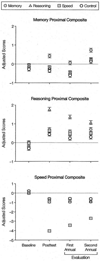Effects of cognitive training interventions with older adults: a randomized controlled trial
- PMID: 12425704
- PMCID: PMC2916176
- DOI: 10.1001/jama.288.18.2271
Effects of cognitive training interventions with older adults: a randomized controlled trial
Abstract
Context: Cognitive function in older adults is related to independent living and need for care. However, few studies have addressed whether improving cognitive functions might have short- or long-term effects on activities related to living independently.
Objective: To evaluate whether 3 cognitive training interventions improve mental abilities and daily functioning in older, independent-living adults.
Design: Randomized, controlled, single-blind trial with recruitment conducted from March 1998 to October 1999 and 2-year follow-up through December 2001.
Setting and participants: Volunteer sample of 2832 persons aged 65 to 94 years recruited from senior housing, community centers, and hospital/clinics in 6 metropolitan areas in the United States.
Interventions: Participants were randomly assigned to 1 of 4 groups: 10-session group training for memory (verbal episodic memory; n = 711), or reasoning (ability to solve problems that follow a serial pattern; n = 705), or speed of processing (visual search and identification; n = 712); or a no-contact control group (n = 704). For the 3 treatment groups, 4-session booster training was offered to a 60% random sample 11 months later.
Main outcome measures: Cognitive function and cognitively demanding everyday functioning.
Results: Thirty participants were incorrectly randomized and were excluded from the analysis. Each intervention improved the targeted cognitive ability compared with baseline, durable to 2 years (P<.001 for all). Eighty-seven percent of speed-, 74% of reasoning-, and 26% of memory-trained participants demonstrated reliable cognitive improvement immediately after the intervention period. Booster training enhanced training gains in speed (P<.001) and reasoning (P<.001) interventions (speed booster, 92%; no booster, 68%; reasoning booster, 72%; no booster, 49%), which were maintained at 2-year follow-up (P<.001 for both). No training effects on everyday functioning were detected at 2 years.
Conclusions: Results support the effectiveness and durability of the cognitive training interventions in improving targeted cognitive abilities. Training effects were of a magnitude equivalent to the amount of decline expected in elderly persons without dementia over 7- to 14-year intervals. Because of minimal functional decline across all groups, longer follow-up is likely required to observe training effects on everyday function.
Figures


Comment in
-
Cognitive training may improve targeted cognitive functions in older adults.Evid Based Ment Health. 2003 May;6(2):54. doi: 10.1136/ebmh.6.2.54. Evid Based Ment Health. 2003. PMID: 12719361 No abstract available.
References
-
- Lowenthal MF, Berkman PC, Buehler JA, Pierce RC, Robinson BC, Trier ML. Aging and Mental Disorder in San Francisco. San Francisco, Calif: Jossey-Bass; 1967.
-
- Wilson RS, Mendes de Leon CF, Barnes LL, et al. Participation in cognitively stimulating activities and risk of incident Alzheimer disease. JAMA. 2002;287:742–748. - PubMed
-
- Churchill JD, Galvez R, Colcombe S, Swain RA, Greenough WT. Exercise, experience, and the aging brain. Neurobiol Aging. In press. - PubMed
-
- Krampe RT, Ericcson KA. Maintaining excellence: deliberate practice and elite performance in young and older pianists. J Exp Psychol Gen. 1996;125:331–359. - PubMed
Publication types
MeSH terms
Grants and funding
- U01 AG14260/AG/NIA NIH HHS/United States
- U01 AG14263/AG/NIA NIH HHS/United States
- U01 NR004508/NR/NINR NIH HHS/United States
- U01 AG014260/AG/NIA NIH HHS/United States
- U01NR04508/NR/NINR NIH HHS/United States
- U01 AG14289/AG/NIA NIH HHS/United States
- U01 NR004507/NR/NINR NIH HHS/United States
- U01 AG014282/AG/NIA NIH HHS/United States
- U01 NR04507/NR/NINR NIH HHS/United States
- U01 AG014276/AG/NIA NIH HHS/United States
- U01 AG014263/AG/NIA NIH HHS/United States
- U01 AG014289/AG/NIA NIH HHS/United States
- U01 AG14282/AG/NIA NIH HHS/United States
LinkOut - more resources
Full Text Sources
Other Literature Sources
Medical

